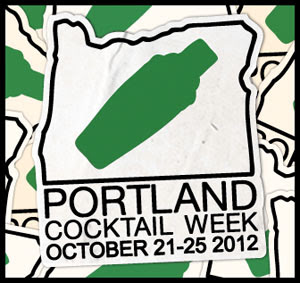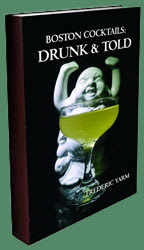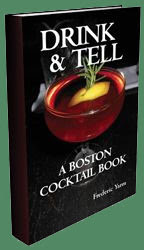 After my talk on Wednesday at Portland Cocktail Week, there was a Drink-Write seminar on how to make the transition from blogger to writer. The three panelists were Lou Bustamonte of SFWeekly, TastingTable, and Food&Wine, Paul Clarke of CocktailChronicles, Imbibe, and TastingTable, and Greg Harned of SeriousEats and Hoochlife. Instead of writing out the quotes and comments chronologically, I will organize them by speaker:
After my talk on Wednesday at Portland Cocktail Week, there was a Drink-Write seminar on how to make the transition from blogger to writer. The three panelists were Lou Bustamonte of SFWeekly, TastingTable, and Food&Wine, Paul Clarke of CocktailChronicles, Imbibe, and TastingTable, and Greg Harned of SeriousEats and Hoochlife. Instead of writing out the quotes and comments chronologically, I will organize them by speaker:Paul Clarke:
• Blogging has no word counts, no deadlines, no editor. It serves as a good resumé to show off your knowledge base.
• When approaching a publication, understand them and their angle to show that you have done your homework.
• In building up a community of writer friends, you can bitch about bad editors as well as send work your friends way. The Mixoloseum chatroom was a great resource for that.
• Rule #1: Do not be an asshole. Maintain visibility with an editor but keep it short with at most 2-3 ideas pitched. Send a few items and wait a week or two, then send a brief reminder email. If no follow up, wait a month or two. If not, let it go and learn to take a hint.
• Trend stories! Editors love the "top 5 or 10 best/hottest ____" articles.
• The most fun stories are related to people. You can get a lot of mileage on a profile on a crazy distiller or other. Pitch story and mention the people.
• Work for free (once you are established)? Hell no! (*) Unless you are doing it for yourself.
• "Fuck you, pay me." Problems with editors in regard to scope creep, expansion with or without pay expansion. Need to set up parameters to be clear about what is expected from you and from them (i.e.: payment terms and deadlines).
• Paul recommended the Smile When You're Lying: Confessions of a Rogue Travel Writer book.
• Give no guarantees that you'll write about anything if you get something sent.
• Remember that glossy national magazines can still screw you over. Hierarchies of editors can end up causing a lot of editing requests. Fewer the better (i.e.: 2-5), but it only takes 1 editor to ruin your life.
• Show up to events, get to know people, be the face of your blog and your writing.
Lou Bustamonte:
• The weeklies are a great place to get a start. They generate a lot of content online, they pay, and look great on resumés.
• For freelancing, write and reach out with some ideas and pitches. Understand their style and house voice. Pitch ideas smartly. Do not overwhelm but keep communication going. Be nice and not too pestering.
• Build up a community of other writers. Talk to each other about good and bad sites; know what places to avoid.
• Doing things for free does not help you in any way once you are established (unlike doing a restaurant stage).
• Be transparent and honest especially when you are being paid off with a free product.
Greg Harned:
• A blog is a great means of building a compendium or portfolio of your work to reference for a new job.
• Learn how to pitch and market ideas to create a role for yourself.
• Writing needs to be leading to something (although not necessarily a direct correlation). Doing things for exposure (like podcasts and talk shows) for free, for example, is good.
• Go to more events, be more involved in community, and value networking highly. Meet as many new people as possible -- not always as a direct path but put out as many spokes to form a hub.
 The 2017 collection of 855 drink recipes, bartender tributes, and essays on hospitality from CocktailVirgin's Frederic Yarm. Available at
The 2017 collection of 855 drink recipes, bartender tributes, and essays on hospitality from CocktailVirgin's Frederic Yarm. Available at  The 2012 collection of 505 drink recipes, techniques, and Boston bar recommendations from Frederic Yarm. Available at
The 2012 collection of 505 drink recipes, techniques, and Boston bar recommendations from Frederic Yarm. Available at 




1 comment:
Thanks for sharing! Love the notes.
Post a Comment